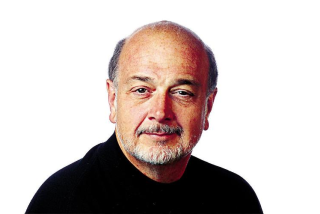Book review: Frank Deford goes deep, as usual
A bio on NPRâs website of its commentator Frank Deford notes that the magazine GQ christened him, quite simply, âthe worldâs greatest sportswriter.â (Is he?) A story on ESPNâs companion website, Grantland, referred to Deford as âa writer who had achieved legendary status by the age of 50.â (Did he?)
OK. Maybe he is, and maybe he did. Wikipediaâs entry for Sports Illustrated â if no one overnight has deleted it â alludes to an editor at that magazine who helped âlaunch the careers of such legendary writers as Frank Deford.â So hmmm, thereâs that L word again. No other career launch is singled out, so it could be true that Defordâs work during that period was as legendary as it got.
Now a sprightly 73 and likely recognizable more for what he says on NPR or HBO than for anything anyone in this 21st century of ours reads, this legendary fellow Deford has produced a memoir, âOver Time: My Life as a Sportswriter,â that might or might not outsell any of his 15 previous books, none of which exactly zoomed to the top of the bestseller lists.
Funny how fickle the printed word can be. Defordâs cred is incredible, his accolades deserved. Yet from a literary-world standpoint, his closest thing to a literary work youâve heard of, fiction or non, might be 1981âs âEverybodyâs All-American,â in part because it became a semi-successful film starring Dennis Quaid.
Benjamin Franklin Deford III is in few ways your everyday sportswriter. He is a tall (6-foot-4), lean, Ivy League-educated chap. His ancestors were âamong the wealthiest families in Baltimore,â he writes. And though Frank himself might not have been born to the purple â a color he frequently wears, as part of a wardrobe that makes him look, in âHBO Real Sportsâ host Bryant Gumbelâs eyes, like âan English fopâ â his dad, also a snappy dresser, did indeed grow up in a stately and servant-filled manse.
A certain Mr. Titman, a fellow Princetonian, became a factor in Defordâs landing a job interview that just as easily could have led him to a periodical life at Time or Life. A while thereafter, Deford began to make his mark within the company, even if Sports Illustrated then wasnât held in a particularly high esteem by the men who ran it.
Thousands of words poured forth. A âlong-form writerâ is what Deford came to be, one who came up with so-called bonus pieces as opposed to one from, say, the baseball or basketball beats. Deford delivered the goods. His profiles were elegant and eloquent. He dabbled in the offbeat â Harlem Globetrotters, roller derby â but also profiled many of the greats and not-so-greats.
It is odd then to read in the writerâs own words how hated some of his stories were. Lew Alcindor (pre-Kareem), Jimmy Connors, Bobby Knight and others were not amused by his views. Disciples of the collegiate coach Bear Bryant were so appalled (by such unnecessary disclosures, in their way of thinking, that Bear had to go to the bathroom a lot), they railed against Defordâs highly complimentary yarn. They cursed and spat at the next S.I. guy who dared to set foot in beautiful downtown Tuscaloosa, Ala. The basketball coach Dean Smith declined to be interviewed by Deford simply because he didnât care for the Bryant piece.
Photographs at Sports Illustrated gave him a hard time as well. Deford details how a long look at Anna Kournikova, accompanied by the tennis player in sultry poses, caused an uproar, with critics faulting him for giving her so much ink and picturing her thataway. They werenât aware or didnât care that it was Kournikova who insisted on a boudoir layout rather than one by a tennis net.
Tennis has fewer friends in the media more dedicated than Deford, whose writings on the likes of Billie Jean King, Big Bill Tilden, flamboyant Ted Tinling and more have been beyond splendid. Nor did the more mainstream team sports and their heroes and villains escape his insight over the years. If you are curious about the strange dreams of Mickey Mantle or Larry Bird, here is a writer who can take you inside their heads.
He does not pull a punch when it comes to boxing or even to the tastes-great, less-filling Miller Lite commercials he once made, where Deford and others came to have no respect (seriously) for a certain Mr. Dangerfield or what a jerk (actually a stronger word) he found wrestling promoter Vince McMahon to be. Just as he can zing a heart string with a shared experience with Jimmy the Greek, a pair of dads who between them lost three kids to cystic fibrosis.
Defordâs career stats include wins and losses, like other greats of sport. His helmsmanship in the â80s of an all-sports tabloid known as the National turned it into the Edsel of newspapers. His lyrical way with words does on occasion go tone-deaf, as with one chapterâs opening line: âWhile the prolonged athletic torpor of my Baltimore was unusual, it was also the case that in the country at whole sport remained incredibly static.â (Uh ⌠huh?)
A healthy ego is not a prerequisite for a memoir, meanwhile, but it must take a certain self-confidence to begin every chapter of one with a quotation from oneself. âOver Timeâ overdoes it quoting Frank Deford quoting Frank Deford.
Legendary? Could be. Could very well be. Thatâs for others to decide, and some obviously have. But from the storytelling department of a magazine made famous and infamous by its pictures of models in swimsuits, many, many, many wonderful writers have emerged, famous or semi. One is definitely Deford, who has long been the genuine article.
Downey is a former Times columnist.
More to Read
The biggest entertainment stories
Get our big stories about Hollywood, film, television, music, arts, culture and more right in your inbox as soon as they publish.
You may occasionally receive promotional content from the Los Angeles Times.










